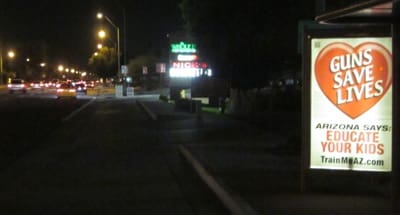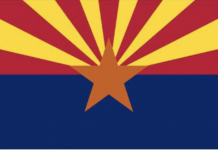The City of Phoenix has a policy on bus shelter billboards, as revealed by the man whose ad was adorning 50 bus stop shelters—until the City pulled the plug. “The Phoenix attorney’s office claimed these were public service announcements (PSA), and those are banned,” said Alan Korwin, manager of the TrainMeAZ campaign and the Publisher at Bloomfield Press, a sponsor of the program. “It’s a bogus excuse — and they know full well we’re an LLC and not a non-profit. The commercial sponsors, shooting ranges and trainers on the website expect to attract customers. The ads are aimed at parents, so they can teach gun safety and the values of marksmanship to their kids.” Yes, well . . .
The ads looks like a PSA to me, which the CIty banned after a 12-year-old 9th Circuit court case re: the Children of the Rosary group and abortion ads. The real questions: was that decision wrong, why did the City “wake up” to their mistake and why isn’t the bus shelter ad biz privatized?





Sounds like it's time for a lawsuit! As a lawyer, I have a love/hate relationship with that phrase, but this clearly constitutes a violation of the 1st Amendment. The government cannot regulate the content of speech unless the regulation directly advances a substantial government interest, and the regulation is narrowly tailored to advance that interest. How does a bogus distinction between 'Public Service Announcements' and mere advertising advance ANY legitimate government interest?
In the meantime, the sponsors at TrainMeAZ might want to retool their marketing campaign to make it more nakedly commercial, by listing a website link to shooting range addresses and prices. This would remove it from the city's (as I've said, bogus) label.
This would be a great test case for the NRA and the ACLU to litigate together. My ACLU friends have always said they don't litigate 2nd Amendment issues because that part of the Bill of Rights already has a vigilant and well-funded advocate in the NRA. It would be nice to see them bury their ideological hatchets and work together to defend all our liberties.
I should have specified that the government cannot regulate *commercial* speech without meeting the above requirements, known as 'intermediate scrutiny.' Noncommercial speech is generally protected even more fiercely, under the 'strict scrutiny' test.
Comments are closed.